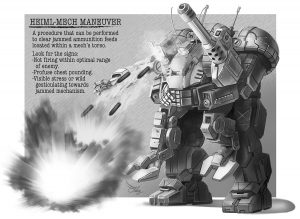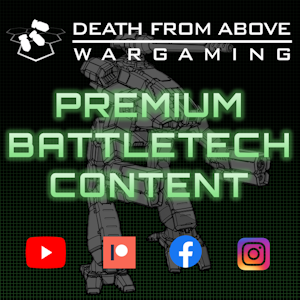Rules Level
Sarna News

- Bad ‘Mechs - Sentinel
- HEXTECH Review - Wave 3 Brings More Urban Options To Your Battlefield
- Your BattleTech News Round-Up For March, 2024
- Crashing 'Mechs With Jennifer Brozek, Author Of The Rogue Academy Trilogy
- Getting The Word Out With Rem Alternis, Catalyst Community & Marketing Director
- Read more →
Contents
Description[edit]
BattleTech has various levels of play with scalable complexity as more advanced rules are introduced. There are variety of options for players of every skill level, from quick matches with very few units, to grand campaigns stretching over multiple theaters with combined arms warfare.
Rules[edit]
Quick-Start Rules[edit]
The BattleTech: Beginner Box contains a partial ruleset which does not include many rules that could be considered too complex for beginners, like tracking heat, and limits turns to three phases: Initiative, Movement, and Weapon Attack. Though not phases as such, Resolving Weapons Fire and Determining Damage are also covered. Importantly, the GATOR acronym is introduced as a mnemonic device for completing attack phases. Combat is limited to BattleMechs only. It has superseded older quick-start rules, such as those found in the Classic BattleTech Introductory Box Set.
Basic Rules[edit]
Published in BattleTech: A Game of Armored Combat, this level of play is more complex, introducing players to heat management, piloting skill rolls, critical effects, and other core rules. It increases the phases to the standard six, introducing the Physical Attack Phase, Heat Phase, and End Phase. The rules are still limited to BattleMechs. The book also contain simplified construction rules for players to modify their 'Mechs. It has superseded older introductory rulebooks, such as the one included in the Classic BattleTech Introductory Box Set.
The rules in BattleTech: Clan Invasion could be considered a companion to the basic rules for Inner Sphere 'Mechs in A Game of Armored Combat, as they cover more exotic Clan weapons and equipment, such as their OmniMechs, their ritualized form of warfare, zellbrigen, and new units like Elemental Battle Armor.
Intermediate Rules[edit]
The BattleMech Manual is a rulebook for BattleMech combat only. Building upon the previous, simplified rules, it is described as an "alternate presentation"[1] of the rules in Total Warfare, intended to provide a "one-stop BattleMech play experience".[1] It is a bridge between the basic rules and Total Warfare, covering the full complexity of BattleMech combat, including rules for their most common weapons and equipment, but it does not include construction rules.
Standard Rules[edit]
Total Warfare contains all the standard, "Tournament Legal" rules, weapons, and equipment used in official games. Furthering the complexity of the previous rulebooks, Total Warfare introduces rules for using infantry, battle armor, ProtoMechs, combat vehicles, support vehicles, aerospace units, and more. It also includes guides for constructing scenarios for play, painting miniatures, and even a few short stories.
The TechManual contains the construction rules and statistics that were used to build the canon "Tournament Legal" units. While unit construction is not part of the standard ruleset for playing games, this is the book that allows the player to build their own custom units. It also contains numerous short technical overviews of various weapons and equipment, as well as overviews of the technology behind BattleMechs themselves.
Advanced & Experimental Rules[edit]
Advanced equipment is in production "in-universe" but have rules generally considered too complex for lower rulesets and too tedious for standard, tournament games, though this is ultimately up to player or official agreement on their use. There is a very rough correspondence to Rules Level 2 equipment under FASA's old tournament rules.
Experimental equipment is being prototyped or has gone out of production. It is also considered rare and exotic technology which is not generally used in standard, tournament games or lower, though this is ultimately up to player or official agreement on their use. There is a very rough correspondence to Level 3 equipment under FASA's old tournament rules.
Both can be found throughout the rulebooks below:
Tactical Operations contains the rules and equipment that deal with or are useful on the tactical level of game play, such as artillery, ECCM, advanced construction, combat, and movement rules, and more. Use of these rules could add a few hours to a single game or more, depending on its size and unit composition.
Campaign Operations contains the rules that deal with or are useful on the campaign level of game play, including rules for complex formations, special pilot abilities, solar system generation, and more. Games can be conducted with multiple Companies with these rules, allowing the players to build specialized Lances for particular roles. Use of these rules for a campaign can involve multiple battle scenarios, perhaps spanning a few days to a more than a week of play.
Strategic Operations contains the rules and equipment that deal with or are useful on the strategic level of game play, including advanced construction and combat rules for aerospace units, rules for aerospace operations, involving units like WarShips, construction rules for FrankenMechs, rules for combat drops, and more. Updated BattleForce rules are introduced for speeding up play at this level by abstracting the detail of Total Warfare.[2] As games are at the Battalion level or higher, the time taken for each depends on the level of abstraction chosen by the players (if any).
Interstellar Operations contains the rules and equipment that deal with or are useful on the interstellar level of game play, including rules for campaigns spanning multiple solar systems, taking place in any BattleTech era published up to that point. The weapons and equipment particular to those eras have their own rules and these are included. This also allows the player, using Inner Sphere at War rules, to conduct historical campaigns. Strategic BattleForce rules, expanding on those found in Strategic Operations, allow the player to conduct battles at the Battalion level and above.[3] Games could potentially take a very long time depending on the level of abstraction chosen.
Alpha Strike[edit]
Parallel to the above are the simplified rules of Alpha Strike: Commander's Edition, which, similar to BattleForce, are geared towards handling large amounts of units without the complexity of standard, tournament rules.[4] A major difference is Alpha Strike's "terrain-driven"[4] gameplay instead of hex-based gameplay: it requires a tape measure and can be played on any 3D terrain. Alpha Strike Quick Start Rules are available to introduce the system at its most basic, and there is also an Alpha Strike Companion volume which provides select, simplified rules drawn from the advanced rulebooks above.[5]
Also See[edit]
Gameplay rules levels published in the Tactical Handbook, BattleTech Compendium, Maximum Tech Revised, and BattleTech Master Rules, Revised Edition.
References[edit]
- ↑ 1.0 1.1 BattleMech Manual, p. 5
- ↑ Strategic Operations, p. 213: "Unless explicitly stated, no Total Warfare rules apply in BattleForce."
- ↑ Interstellar Operations, p. 230: "SBF takes this process even further, allowing a player to field multiple battalions and even regiments on a battlefield potentially spanning kilometers in scope."
- ↑ 4.0 4.1 Alpha Strike: Commander's Edition, p. 23: the rules "reduce the detail level found in the Total Warfare style of play, abstracting away the various nuances of each unit’s weapons, armor, and structural designs in favor of a faster-playing system."
- ↑ Alpha Strike Companion, p. 7: "provides a host of supplemental rules all devised to add greater depth to the Alpha Strike playing experience, while retaining the fast-playing rules in the core book."

